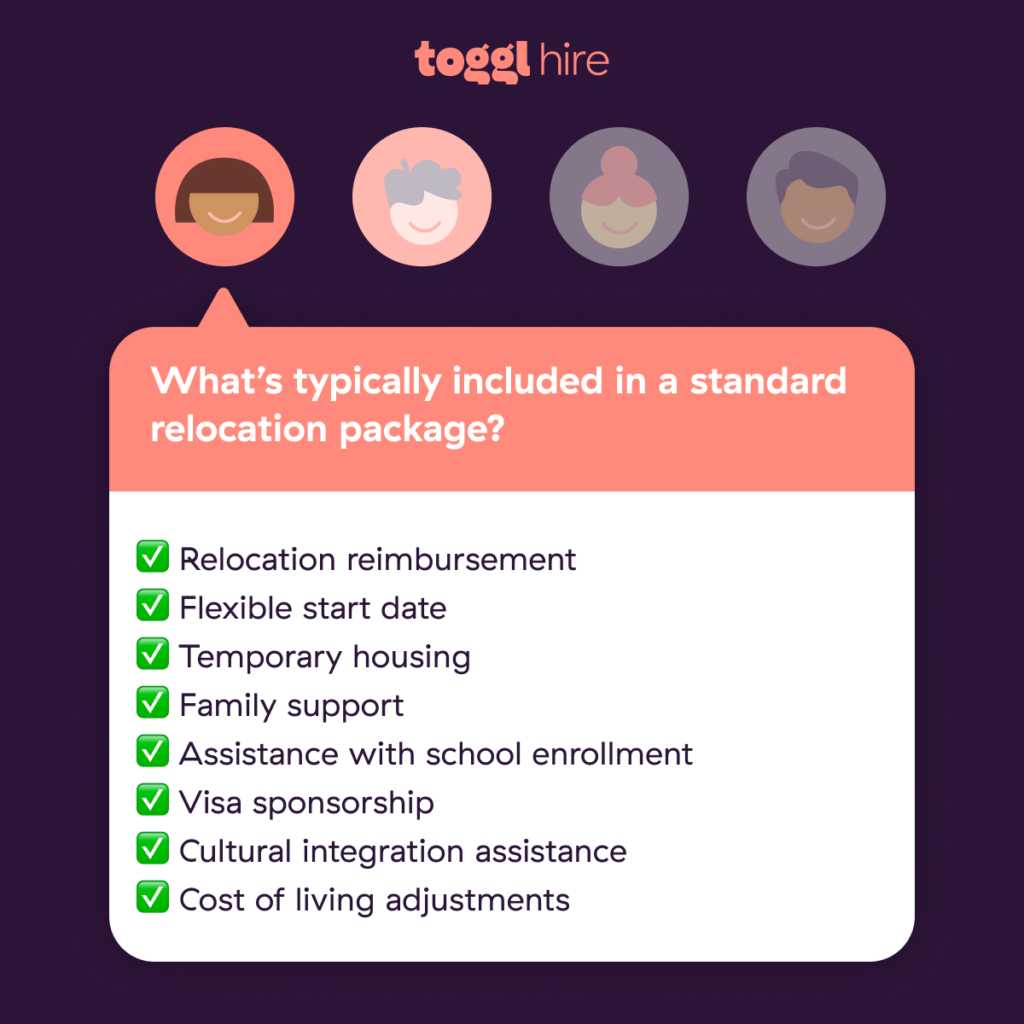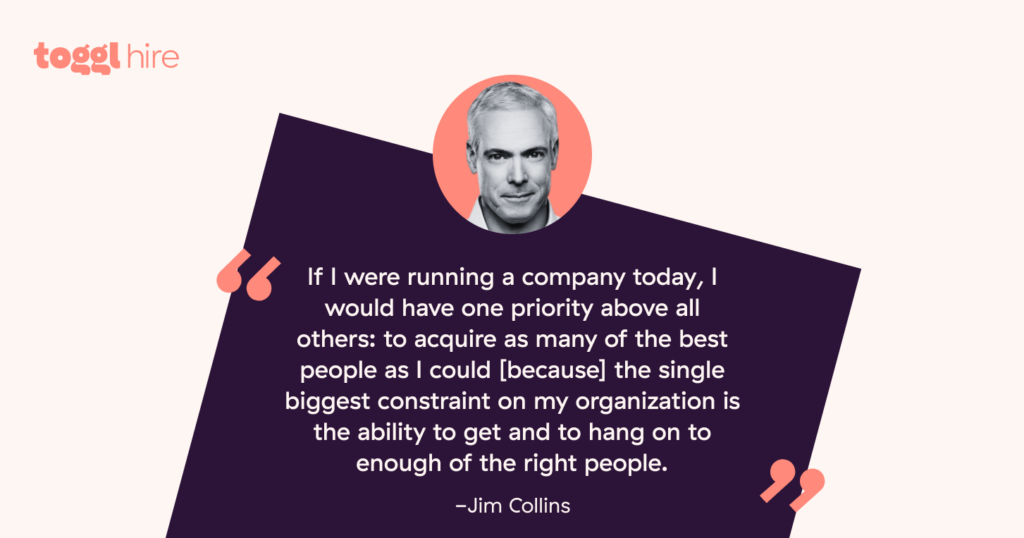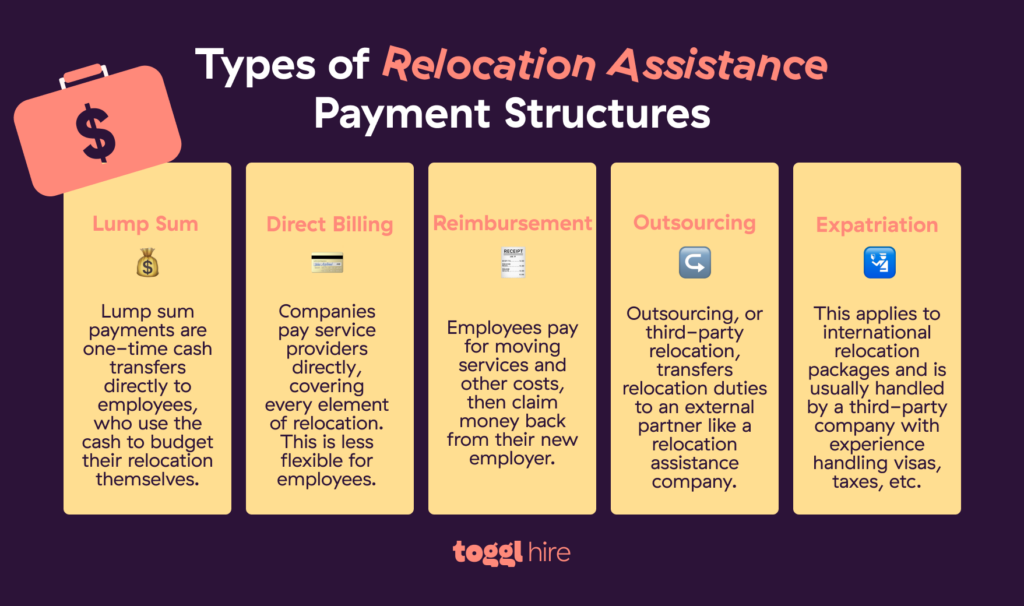While sourcing from a global talent pool opens you up to numerous benefits, including greater diversity and unique skill sets, the downside is that your perfect hire is likely based elsewhere. While you might find the ideal candidate by widening your net, you’ll also likely have to persuade them to uproot their lives if you want them to relocate to a specific office.
Attractive relocation packages to ease the stress of moving to a new location are often the only way to secure the brightest employees. Relocation packages take care of mundane essentials, so hires can focus on starting work instead of handling random logistical tasks.
That all sounds great, but what do company relocation packages involve? How do you create packages economically and align benefits with your business strategy? Here’s how to assemble packages to secure the talent you need.
TL;DR — Key Takeaways
A relocation package covers the costs involved when employees move long distances to start new roles. Companies use them to attract talented candidates and ease the burden of changing locations.
Elements of an employee relocation package include hiring a moving company, insuring possessions, arranging temporary housing, finding schools, and helping spouses or family members. International moves require assistance with visas, passports, and – most likely – cultural integration.
The average relocation package costs around $50-70k. The cost of relocating is lower when an employee rents, averaging around $20k. However, the average relocation package for employees who own their properties costs around $100k.
Companies can structure an employee relocation package in many ways. Lump sum payments and reimbursement give employees total control. Direct billing and outsourcing hand responsibility to HR managers and third-party experts.
Relocating employees is simpler when companies select the best candidates for every role. Highly motivated employees are well-suited to their new roles. They are more likely to integrate quickly and benefit from relocation benefits. Use Toggl Hire’s assessment tools to find hires with the skills you need.
What is an employee relocation package?
Employee relocation packages are services or financial benefits designed to make it easy for new hires to relocate. Companies usually negotiate features of the package when extending offers (as they’re usually very specific and customized), but you can also specify them in job advertisements.
Well-constructed relocation packages benefit both the employer and new hires. On the employee side, these packages reduce the cost of relocating, making moving both financially and emotionally easier. Instead of having to focus on all the tasks that come with relocation, they can spend time adjusting to their new role.
Employers benefit from relocation packages by using them to widen their talent pool. For example, the CRM professional you need to drive business growth could be in Seattle while your HQ is in Boston. It takes more than competitive wages to attract distant candidates who rarely lack options.
A new hire is more likely to trek across the country if their new employer pays for professional movers, insurance, and temporary housing. This type of reimbursement is even more appealing for international relocation, where visas and language training complicate matters.
What’s typically included in relocation packages?
There’s no standard formula for a job relocation package or the total relocation cost. The mix of benefits depends on various factors.
For example, an expanding US eCommerce retailer may need a highly skilled manager for its new headquarters in Brazil. After running through a few rounds of recruitment in Brazil, if they haven’t found a fit, they’d open the position up to international candidates.
As the manager of the entire branch, they’d have to relocate to Brazil for the job, and relocation assistance might include visa sponsorship, flights, and comprehensive insurance and accommodation assistance.
The same retailer boosting its operations across different states in the US may not need to offer such extensive relocation benefits. Financial help with housing and moving costs could be sufficient for a relocating employee moving from Phoenix to Seattle.
Nevertheless, there are certain features you frequently see in relocation packages, so we’ve highlighted some critical benefits to consider offering future recruits.

Relocation reimbursement
This part of the relocation package covers general moving expenses. Packing possessions, hauling items cross-country, and enlisting unpacking services all add up. How much you cover is up to you.
For example, some companies provide cash reimbursement for packing supplies and gasoline. Some prefer hiring professional movers on behalf of new employees to manage relocations from door to door.
Flexible start date
This is what some call a quality-of-life benefit, and it’s a great way to show your new employee that you care about their well-being.
After all, moving homes, goods, and families long distances is complex. Relocating employees can involve heart-wrenching goodbyes and lengthy house sales. Flexibility makes everything easier.
Temporary housing
In theory, the relocation process should run smoothly. Employees sell their old properties, hop on a plane, and arrive at a new home to meet a realtor holding their keys. Of course, this hardly ever happens. Most people need temporary housing before they secure the ideal living space.
That’s why employee relocation packages often include real estate cost assistance like funds for temporary housing or hotel accommodation. Funds are generally time-limited but generous enough for a thorough local property search.
Family support
Family support in the relocation process often includes childcare, medical care or insurance for dependents, and even career help for spouses.
Why invest in your new hire’s family? Aside from being the right thing to do, it helps ensure a smooth transition as they move to the new city and get adjusted to their new role and life.
School location assistance
Employees with children need to get those children enrolled in new schools, and that’s nothing, if not a very time-consuming and stressful process.
That’s why it pays to consider education costs when determining relocation expenses. Trust us — employees with kids will love the assistance.
Visa sponsorship
Paying for visa sponsorship for the worker and their family is one thing. Offering to handle all the paperwork and administrative stuff is another, and you can do either.
However, visa paperwork and navigating bureaucracy in a new country is complex for someone to handle on their own, especially if all they’re thinking about is actually moving their entire life.
Plus, if they get it wrong, it could lead to legal issues that prevent them from being able to work as soon as they arrive. It’s often why most companies include visa sponsorship and payment of legal fees in a relocation package.
Integration and cultural assistance
Everyone needs time to settle in when they relocate. However, people moving to a different country may require more support. Services like language training, mentoring, or connecting hires with community groups are common parts of relocation packages.
Cost of living adjustments
Moving to a new location shouldn’t require the new employee to have to downgrade their lifestyle. Job seekers (understandably) shy away from moving to areas where their wages won’t cover living costs.
That’s why a good relocation package often includes compensation or relocation bonuses to help new hires adjust financially to their new locations. Companies may also offer accounting support to manage a new employee’s tax liabilities.
Payback clause
Finally, employee relocation packages usually include clauses protecting the employer. Payback clauses require financial reimbursement of a company’s relocation costs unless employees pass a pre-defined transition period.
A payback clause is routine and should never feel or sound like a threat. Instead, clauses should promote commitment over the medium term. They enable employers to be generous in other areas, knowing they are protected if employees leave immediately after arriving.
How much do employee relocation packages cost?
The cost of employee relocation packages varies between roles, companies, and employee circumstances. If you include all of the above elements, the cost of relocating employees can be extremely high. However, typical relocation packages are usually more targeted.
Housing is a big chunk of a typical employee relocation package. If the employee temporarily rents accommodation, expect costs between $20-25k. If you need to purchase corporate property for housing or support a home purchase, package costs range from $70-100k.
Sponsoring work visas also raises costs. Attorney fees to sponsor someone under the H-1B program can exceed $3k. Multiply sponsorship fees for a small family, and the price increases to around $10k.
Moving expenses also add up quickly when relocating employees. International shipping prices vary, but moving costs of $5-10k are common. Even hiring a U-Haul container for a cross-country move costs over $2k when you include unpacking services.
Overall relocation package costs could be as low as $5k or as high as $120k. Average job relocation packages tend to total around $50-70k. However, remember these are estimates. Single U.S. citizens who can pack everything in a trailer incur dramatically lower costs. By contrast, an executive relocation package could cost upwards of $200k.
The bottom line? Relocation is a moving target. Packages should suit each situation.
Benefits of offering employee relocation packages
Given the costs above, you might wonder whether offering employee relocation packages makes sense. While not all new hires need support, there are several excellent reasons to offer relocation bonuses or a full employee relocation package.
For instance, supporting employee relocation helps retain staff. Workers are less likely to become unsettled and return home, cutting recruitment costs in the case of a re-hire. Well-supported workers are usually more productive and engaged, too — boosting your revenues and offsetting relocation costs.
Here are a few other long-term benefits you can compare against costs.
Attract high-quality talent
Benefit number one is simple: an attractive relocation package persuades elite job seekers to disrupt their lives and embrace potentially risky opportunities.
Recruiters compete for top talent nationally and worldwide. Anything making a position more appealing will help attract skilled workers. High-level job seekers generally aren’t lacking offers, meaning generous relocation bonuses could help make the decision to join your company easier.
Moreover, relocation packages boost your employer branding. Over time, you can build a reputation for being a great employer that top talent jumps at the chance to work with. This makes reaching the best candidates a lot easier (and a lot less expensive).
Enhances employee satisfaction and retention
Relocation benefits also pay off after the job offer. Moving between cities or countries is stressful and expensive. An anxious relocated employee probably won’t perform well, becoming depressed or distracted from their work. Decreased productivity results.
Supportive employers tend to see higher job satisfaction ratings among current staff. Even better, relocation assistance promotes loyalty and employee retention. Employees stay longer and buy into the company mission — generating big long-term benefits.
Supports company growth and expansion
The third benefit of relocation packages is strategic. Relocation benefits let you tap into a wider pool of skilled employees by hiring international employees. Companies can mobilize talent where they need it and build teams to expand into new markets.
Corporate relocation packages make it easier to move employees between locations. Managers setting up offices in new states or continents could ensure continuity by relocating an existing employee. Geography does not have to constrain company growth.

Drawbacks of offering employee relocation packages
Relocation support comes with, as you can see, plenty of benefits. But it’s also important to be realistic and strategic. While you won’t likely want to avoid relocation packages altogether if you’re asking new employees to relocate to a new city or country, here are some things to consider before you go all in.
High costs
There’s no way around it — relocating employees costs money. A lot of money. Shipping possessions, furnishing properties, arranging temporary housing, and sorting out visas are all costly tasks.
As we’ve seen, the cost of an executive relocation package can quickly increase into the thousands. That’s probably too high for many smaller companies or startups to handle or even justify.
Risk of unmet expectations
The second drawback is slightly more subtle. Employee benefits must be meaningful and deliver on your promises. However, some employees expect more from relocation packages than employers can reasonably deliver.
Lump sum payments for moving and settling in may not cover everything the new hire needs. Recruiters can miscommunicate the terms of packages, leading to confusion or an unexpected financial burden. In both situations, you risk having dissatisfied employees right from the start.
Alternatively, badly planned packages make relocation stressful and unnecessarily complex. In worst cases, employees fending for themselves would be better.
How to create a relocation package for your employees
Like regular benefits packages, relocation packages work well when they fit the needs of companies and employees. It helps to follow a standard relocation package routine to standardize requirements and tick off elements you need.
Assess your company’s needs and budget
Before offering relocation assistance, assess your means. Can you afford to offer temporary housing assistance and all moving expenses? Will packages apply to all new staffers or only those above a certain seniority level?
When budgeting for relocation, think about where employees are coming from. If you recruit internationally, costs increase incrementally. Moving families to a new location also tends to cost more than relocation reimbursement for a solo worker.
The result of this stage should be a clear understanding of relocation assistance budgets. Create a ballpark figure for an average relocation package. Use the average as a basis to build customized packages.
Determine what relocation expenses to include in the package
Next, think about what elements must be present to attract employees and meet their relocation needs. Use our list of relocation package components above to guide you.
Consider housing requirements, family services, moving operations, visas, and cost-of-living adjustments hires might need. Compare your offer to similar companies to ensure your package measures up.
Run relocation packages by existing employees — preferably those who have relocated previously. They can advise about missing elements and ways to tailor your offer.
Decide on a payment structure
How you structure relocation packages is critical. If you offer flexible terms, set caps based on realistic needs. Explain these limits clearly when hiring to avoid misunderstandings.
Unsure what kind of payment structure best fits your relocation package? The list below covers the most common methods, but customize packages to suit your budget and needs.
Lump sum
Lump sum payments are one-time cash transfers directly to employees. Companies agree on a rough estimate for moving and transportation costs and send that to the employee, who pays for services during the move themselves. They can usually keep any surplus.
There is also a tax issue that comes with offering lump sum payments for employee relocation assistance that’s helfpul to be aware of (or at least make your employees aware of). The IRS views lump sums as part of gross income. The tax gross-up is considered taxable income, reducing the amount workers have to fund their move.
Direct billing
With this relocation package setup, companies pay service providers directly, covering every element of relocation. This method is less flexible, as employees must accept providers their employer selects.
However, direct billing is convenient for companies and employees alike. Workers don’t need to shop around for a moving company or insurer, while employers can control costs incurred (provided they select trustworthy partners).
Reimbursement
With this setup, employees pay for moving services and accommodation, then claim money back from their new employer. This leaves them open to plan their move to a new city as long as it’s within pre-defined reimbursement limits.
On the negative side, reimbursement requires employees to gather and store receipts, which is just another small and annoying task in an already stressful situation.
Outsourced relocation
Also known as third-party relocation, outsourcing transfers relocation duties to an external partner. Relocation specialists, usually part of a larger relocation assistance company, relocate employees, move goods, source furnishings, and arrange temporary housing.
Third parties bring specialist skills employers and new employees lack. However, employers do not directly control the process. Outsourcing may also raise costs if companies choose to work with relocation companies who don’t know what they’re doing.
Expatriation assistance
Expatriation assistance applies to international relocation packages. Companies usually handle expatriation internally, although global mobility services may play a role. The process focuses on smooth administration, finances, passports, and even issues like how to offset tax liabilities.
Expatriation may also include cultural transitions. For instance, packages could provide local tours, mentoring, driving instruction, or language courses.

Offer support beyond financial assistance
A well-designed relocation policy meets human needs during a stressful time. Don’t look at the package as a billing process. Great companies offer benefits to make life easier for real-life employees.
For instance, employees with young children need good schools, tutoring, childcare, or even access to local sports teams and activities. Spouses may need employment support or retraining. International arrivals may appreciate courses about local culture and laws.
An employee relocation package should feel personal. Personalized packages promote loyalty and job satisfaction, and they help you understand employee needs.
Communicate clearly and provide documentation
Employee relocation packages are useless if employees don’t understand them. Communicate benefits during the recruitment process and provide detailed documentation about how to claim relocation benefits.
Review and adjust policies regularly
Human resources teams should review their packages regularly to ensure they provide good value for money and meet the needs of relocated employees. Gathering feedback from previously relocated staff is a good idea.
Above all, take a flexible approach to employee relocation. Maintain a range of package templates in your relocation policy. Templates ensure HR experts are well-positioned to build packages for each new employee.
Ensure you’re hiring the right employees
While the cost of your average relocation package varies depending on several factors, one thing is certain regarding these kinds of benefits: they mean nothing if you’re not hiring the right people in the first place.
Well-chosen employees are excited about taking on new roles regardless of where they have to relocate to. They work well with future managers and engage with the relocation process. The right employees are also less likely to leave quickly after arriving at their new location.
How can you ensure you’re hiring the right people? Simple. A slick employee selection process aligns hires to roles and personalities to company cultures. Employees can focus on settling in, confident they’ve made the right decision.
Toggl Hire can help you find staff with the perfect skill sets. Our expert-curated skill tests assess candidate strengths and qualities, providing a simple route to better hires. Sign up for a free account to start assessing talent to ensure you’re bringing the right people on board.

Elizabeth is an experienced entrepreneur and content marketer. She has nine years of experience helping grow businesses and has experienced first-hand the impact of skills-based hiring in today's global, digital world.




